#phpunit testing
Explore tagged Tumblr posts
Text
How to Write Your First Test Case Using PHPUnit & Kernel in Drupal
Confused about whether to opt for PHPUnit or Kernel testing in your Drupal project? Our article simplifies the choice and guides you through their effective implementation!

0 notes
Text
PEST, Framework Unit Test untuk PHP
PEST merupakan framework testing untuk php, yang berfokus pada kesederhanaan dan bertujuan untuk membuat testing lebih menyenangkan. Pest dibuat di atas PHPUnit, jadi migrasi dari PHPUnit ke PEST relatif mudah
Apa itu Unit Test? Unit test Unit testing adalah jenis pengujian perangkat lunak yang menguji bagian terkecil dari kode, yaitu unit, secara terpisah untuk memastikan bahwa setiap unit berfungsi sebagaimana mestinya. Unit biasanya berupa fungsi, metode, atau kelas dalam suatu program. Continue reading PEST, Framework Unit Test untuk PHP
0 notes
Text
Top 10 Laravel Development Companies in the USA in 2024
Laravel is a widely-used open-source PHP web framework designed for creating web applications using the model-view-controller (MVC) architectural pattern. It offers developers a structured and expressive syntax, as well as a variety of built-in features and tools to enhance the efficiency and enjoyment of the development process.

Key components of Laravel include:
1. Eloquent ORM (Object-Relational Mapping): Laravel simplifies database interactions by enabling developers to work with database records as objects through a powerful ORM.
2. Routing: Laravel provides a straightforward and expressive method for defining application routes, simplifying the handling of incoming HTTP requests.
3. Middleware: This feature allows for the filtering of HTTP requests entering the application, making it useful for tasks like authentication, logging, and CSRF protection.
4. Artisan CLI (Command Line Interface): Laravel comes with Artisan, a robust command-line tool that offers commands for tasks such as database migrations, seeding, and generating boilerplate code.
5. Database Migrations and Seeding: Laravel's migration system enables version control of the database schema and easy sharing of changes across the team. Seeding allows for populating the database with test data.
6. Queue Management: Laravel's queue system permits deferred or background processing of tasks, which can enhance application performance and responsiveness.
7. Task Scheduling: Laravel provides a convenient way to define scheduled tasks within the application.
What are the reasons to opt for Laravel Web Development?
Laravel makes web development easier, developers more productive, and web applications more secure and scalable, making it one of the most important frameworks in web development.
There are multiple compelling reasons to choose Laravel for web development:
1. Clean and Organized Code: Laravel provides a sleek and expressive syntax, making writing and maintaining code simple. Its well-structured architecture follows the MVC pattern, enhancing code readability and maintainability.
2. Extensive Feature Set: Laravel comes with a wide range of built-in features and tools, including authentication, routing, caching, and session management.
3. Rapid Development: With built-in templates, ORM (Object-Relational Mapping), and powerful CLI (Command Line Interface) tools, Laravel empowers developers to build web applications quickly and efficiently.
4. Robust Security Measures: Laravel incorporates various security features such as encryption, CSRF (Cross-Site Request Forgery) protection, authentication, and authorization mechanisms.
5. Thriving Community and Ecosystem: Laravel boasts a large and active community of developers who provide extensive documentation, tutorials, and forums for support.
6. Database Management: Laravel's migration system allows developers to manage database schemas effortlessly, enabling version control and easy sharing of database changes across teams. Seeders facilitate the seeding of databases with test data, streamlining the testing and development process.
7. Comprehensive Testing Support: Laravel offers robust testing support, including integration with PHPUnit for writing unit and feature tests. It ensures that applications are thoroughly tested and reliable, reducing the risk of bugs and issues in production.
8. Scalability and Performance: Laravel provides scalability options such as database sharding, queue management, and caching mechanisms. These features enable applications to handle increased traffic and scale effectively.
Top 10 Laravel Development Companies in the USA in 2024
The Laravel framework is widely utilised by top Laravel development companies. It stands out among other web application development frameworks due to its advanced features and development tools that expedite web development. Therefore, this article aims to provide a list of the top 10 Laravel Development Companies in 2024, assisting you in selecting a suitable Laravel development company in the USA for your project.
IBR Infotech

IBR Infotech excels in providing high-quality Laravel web development services through its team of skilled Laravel developers. Enhance your online visibility with their committed Laravel development team, which is prepared to turn your ideas into reality accurately and effectively. Count on their top-notch services to receive the best as they customise solutions to your business requirements. Being a well-known Laravel Web Development Company IBR infotech is offering the We provide bespoke Laravel solutions to our worldwide customer base in the United States, United Kingdom, Europe, and Australia, ensuring prompt delivery and competitive pricing.
Additional Information-
GoodFirms : 5.0
Avg. hourly rate: $25 — $49 / hr
No. Employee: 10–49
Founded Year : 2014
Verve Systems
Elevate your enterprise with Verve Systems' Laravel development expertise. They craft scalable, user-centric web applications using the powerful Laravel framework. Their solutions enhance consumer experience through intuitive interfaces and ensure security and performance for your business.
Additional Information-
GoodFirms : 5.0
Avg. hourly rate: $25
No. Employee: 50–249
Founded Year : 2009
KrishaWeb

KrishaWeb is a world-class Laravel Development company that offers tailor-made web solutions to our clients. Whether you are stuck up with a website concept or want an AI-integrated application or a fully-fledged enterprise Laravel application, they can help you.
Additional Information-
GoodFirms : 5.0
Avg. hourly rate: $50 - $99/hr
No. Employee: 50 - 249
Founded Year : 2008
Bacancy
Bacancy is a top-rated Laravel Development Company in India, USA, Canada, and Australia. They follow Agile SDLC methodology to build enterprise-grade solutions using the Laravel framework. They use Ajax-enabled widgets, model view controller patterns, and built-in tools to create robust, reliable, and scalable web solutions
Additional Information-
GoodFirms : 4.8
Avg. hourly rate: $25 - $49/hr
No. Employee: 250 - 999
Founded Year : 2011
Elsner
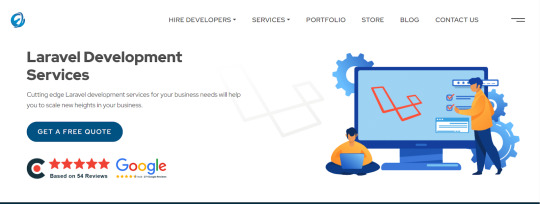
Elsner Technologies is a Laravel development company that has gained a high level of expertise in Laravel, one of the most popular PHP-based frameworks available in the market today. With the help of their Laravel Web Development services, you can expect both professional and highly imaginative web and mobile applications.
Additional Information-
GoodFirms : 5
Avg. hourly rate: < $25/hr
No. Employee: 250 - 999
Founded Year : 2006
Logicspice

Logicspice stands as an expert and professional Laravel web development service provider, catering to enterprises of diverse scales and industries. Leveraging the prowess of Laravel, an open-source PHP framework renowned for its ability to expedite the creation of secure, scalable, and feature-rich web applications.
Additional Information-
GoodFirms : 5
Avg. hourly rate: < $25/hr
No. Employee: 50 - 249
Founded Year : 2006
Sapphire Software Solutions
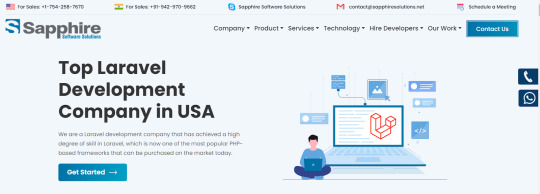
Sapphire Software Solutions, a leading Laravel development company in the USA, specialises in customised Laravel development, enterprise solutions,.With a reputation for excellence, they deliver top-notch services tailored to meet your unique business needs.
Additional Information-
GoodFirms : 5
Avg. hourly rate: NA
No. Employee: 50 - 249
Founded Year : 2002
iGex Solutions
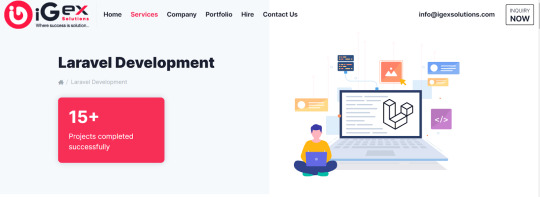
iGex Solutions offers the World’s Best Laravel Development Services with 14+ years of Industry Experience. They have 10+ Laravel Developer Experts. 100+ Elite Happy Clients from there Services. 100% Client Satisfaction Services with Affordable Laravel Development Cost.
Additional Information-
GoodFirms : 4.7
Avg. hourly rate: < $25/hr
No. Employee: 10 - 49
Founded Year : 2009
Hidden Brains
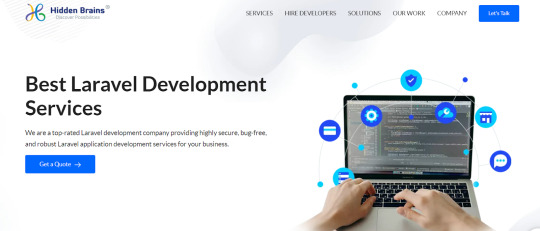
Hidden Brains is a leading Laravel web development company, building high-performance Laravel applications using the advantage of Laravel's framework features. As a reputed Laravel application development company, they believe your web application should accomplish the goals and can stay ahead of the rest.
Additional Information-
GoodFirms : 4.9
Avg. hourly rate: < $25/hr
No. Employee: 250 - 999
Founded Year : 2003
Matellio
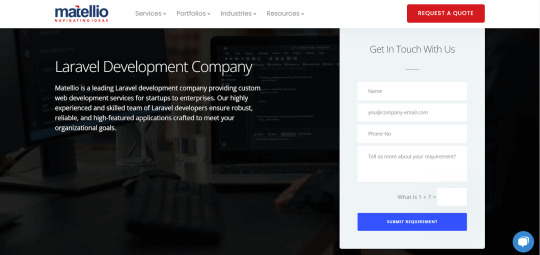
At Matellio, They offer a wide range of custom Laravel web development services to meet the unique needs of their global clientele. There expert Laravel developers have extensive experience creating robust, reliable, and feature-rich applications
Additional Information-
GoodFirms : 4.8
Avg. hourly rate: $50 - $99/hr
No. Employee: 50 - 249
Founded Year : 2014
What advantages does Laravel offer for your web application development?
Laravel, a popular PHP framework, offers several advantages for web application development:
Elegant Syntax
Modular Packaging
MVC Architecture Support
Database Migration System
Blade Templating Engine
Authentication and Authorization
Artisan Console
Testing Support
Community and Documentation
Conclusion:
I hope you found the information provided in the article to be enlightening and that it offered valuable insights into the top Laravel development companies.
These reputable Laravel development companies have a proven track record of creating customised solutions for various sectors, meeting client requirements with precision.
Over time, these highlighted Laravel developers for hire have completed numerous projects with success and are well-equipped to help advance your business.
Before finalising your choice of a Laravel web development partner, it is essential to request a detailed cost estimate and carefully examine their portfolio of past work.
#Laravel Development Companies#Laravel Development Companies in USA#Laravel Development Company#Laravel Web Development Companies#Laravel Web Development Services
2 notes
·
View notes
Text
Laravel Programming: A Comprehensive Guide
Table of Contents
Introduction to Laravel
Why Use Laravel?
Installing Laravel
Laravel Folder Structure
Routing and Controllers
Blade Templating Engine
Laravel Models and Eloquent ORM
Migrations and Database Seeding
Request Lifecycle and Middleware
Form Handling and Validation
Authentication and Authorization
Laravel Artisan CLI
RESTful API Development in Laravel
Testing in Laravel
Deployment and Performance Optimization
Laravel Ecosystem and Tools
Conclusion
1. Introduction to Laravel
Laravel is an open-source PHP framework built by Taylor Otwell. It follows the MVC (Model-View-Controller) architectural pattern, which promotes a clean separation between business logic, UI, and data.
Laravel aims to make development faster and easier by providing powerful tools such as:
Routing
Middleware
Authentication
Blade templating
ORM (Eloquent)
Queues
Artisan command-line tool
Laravel is currently one of the most popular PHP frameworks and powers thousands of web applications globally.
2. Why Use Laravel?
Benefits of Laravel:
Clean and Elegant Syntax: Laravel simplifies complex tasks.
MVC Architecture: Ensures separation of concerns.
Eloquent ORM: Elegant database abstraction layer.
Blade Templating: Lightweight yet powerful templating engine.
Built-in Authentication & Authorization: Secure and easy to implement.
Community and Ecosystem: Laravel has a rich ecosystem like Nova, Horizon, Forge, Envoyer, etc.
Testing Ready: PHPUnit integration for test-driven development (TDD).
0 notes
Text
Top PHP Development Tools Every Developer Must Use

Powerful PHP Development Tools Every Developer Needs
When it comes to building fast, scalable, and secure web applications, PHP Development Tools play a crucial role in improving a developer's workflow. These tools simplify complex coding tasks, increase productivity, and reduce time-to-market applications. Whether you’re a freelancer, part of an agency, or seeking a PHP Development Tools Company, leveraging the right stack can make all the difference.
From debugging to deployment, PHP development tools have evolved rapidly. They now offer integrated environments, package managers, testing frameworks, and much more. This makes it easier for PHP Development Tools Companies to deliver high-quality software products consistently. Let's explore the must-have PHP tools and how they benefit both beginners and expert developers.
1. PHPStorm
A go-to IDE for PHP developers, PHPStorm offers intelligent code assistance, debugging, and testing. Its seamless integration with frameworks like Laravel, Symfony, and WordPress makes it indispensable for modern development workflows.
2. Xdebug
Xdebug is an extension for debugging and profiling PHP code. It helps developers trace errors quickly, providing a detailed breakdown of stack traces, memory usage, and performance bottlenecks.
3. Composer
Composer is a dependency manager that enables developers to manage libraries, tools, and packages easily. It’s essential for maintaining consistency in your PHP project and avoiding compatibility issues.
4. Laravel Forge
For Laravel lovers, Forge is an excellent server management tool. It simplifies the deployment of PHP apps to cloud providers like DigitalOcean, Linode, and AWS.
5. NetBeans
NetBeans is another powerful IDE with extensive support for PHP development. It supports multiple languages and integrates well with Git, SVN, and Mercurial.
✅ Book an Appointment with a PHP Expert
Looking to scale your PHP project with confidence? Book an Appointment Today, get expert insights, cost breakdowns, and the right strategy tailored to your business.
6. PHPUnit
When it comes to testing PHP applications, PHPUnit is the industry standard. It helps developers write unit tests, perform test-driven development (TDD), and ensure that code changes don’t break functionality.
7. Sublime Text + PHP Extensions
While not a dedicated PHP IDE, Sublime Text is lightweight, highly customizable, and loved for its speed. With PHP-specific plugins, it can be transformed into a lean PHP development machine.
Why PHP Development Tools Matter for Businesses
Companies offering PHP Development Tools Services focus on providing complete solutions, from development to deployment. These tools empower developers to build robust applications while maintaining security and performance standards. If you’re considering hiring a partner, choosing a PHP Development Tools Solution from a reputed firm can cut down your development time and cost.
In India, the demand for reliable PHP Development Tools in India is on the rise. Indian companies are known for offering affordable, high-quality services that meet global standards. Whether you're a startup or a large enterprise, opting to Hire PHP Developer in India is a strategic move.
The PHP Development Tools Cost varies depending on the features and scale of the project. However, the ROI is often significant, thanks to better code quality, reduced bugs, and faster deployment cycles.
Conclusion
Choosing the right PHP development tools can significantly impact the success of your web projects. From powerful IDEs like PHPStorm to essential tools like Composer and PHPUnit, every tool serves a unique purpose. Collaborating with a professional PHP Development Tools Company or availing PHP Development Tools Services ensures you have access to expert knowledge, efficient workflows, and scalable solutions.
0 notes
Text
Career in Software Testing
Career in Software Testing plays a vital role in ensuring the quality, reliability, and security of web applications built using the PHP programming language. Since PHP is extensively used for developing dynamic websites, content management systems, and e-commerce platforms, testing becomes essential to prevent bugs, security vulnerabilities, and performance issues. Testing in PHP covers multiple levels, including unit testing, integration testing, system testing, and acceptance testing, which together ensure that individual components, their interactions, and the entire application behave as expected.
One of the most widely used tools for PHP testing is PHP Unit, a robust unit testing framework that supports test-driven development (TDD) and behavior-driven development (BDD). It allows developers to create automated tests that verify the logic of individual functions or classes, reducing the likelihood of regressions during future updates. For higher-level testing, tools like Be hat are used for behavior-driven testing, where test scenarios are written in human-readable language (Gherkin), making collaboration easier between developers and non-technical stakeholders Career in Software Testing.
🔹 Short Points: Software Testing in PHP
Validates functionality and performance of PHP applications.
Includes unit, integration, system, and acceptance testing.
Uses tools like PHPUnit, Behat, and Codeception.
Supports TDD (Test-Driven Development) and BDD (Behavior-Driven Development).
Integrates with CI/CD for automated testing pipelines.
Enables mocking and database testing for realistic simulations.
Improves security by testing for vulnerabilities (e.g., SQL injection, XSS).
Enhances code quality, maintainability, and team collaboration. Phone: 9511803947 Email: codingbit.com
#LearnPHP#CareerInTesting#SoftwareTestingCourse#TestingJobs#TechCareer#PHPUnit#Behat#Codeception#CI_CD#Mockery
0 notes
Text
Why do you think Laravel is popular among developers?
Laravel is popular among developers for a variety of reasons, both technical and practical. Here's why it stands out:
Elegant Syntax
Laravel offers clean, readable, and expressive syntax, making development faster and more enjoyable.
MVC Architecture
It follows the Model-View-Controller (MVC) pattern, helping developers keep code organized, scalable, and maintainable.
Built-in Tools and Features
Laravel includes powerful built-in tools like Blade Templating Engine, Eloquent ORM for database interaction, Artisan CLI for automating tasks, Routing, Authentication, Queues, Mail, and more
Rapid Application Development
Laravel comes with tools that help in quick prototyping and faster project completion.
Security
It offers robust security features like CSRF protection, password hashing, and SQL injection prevention right out of the box.
Strong Ecosystem
Laravel’s ecosystem includes tools like Laravel Forge (server deployment), Laravel Vapor (serverless deployment), Laravel Nova (admin panel), Laravel Mix (asset compilation)
Huge Community Support
Laravel has a large, active community and excellent documentation, which makes it easy to find help and resources.
Testing Made Easy
Laravel is built with testing in mind and includes PHPUnit support by default, helping developers ensure quality code.
Scalability
With support for microservices and integrations with cloud services, Laravel apps can scale effectively for enterprise use.
API-Ready
Laravel makes it easy to build RESTful APIs or even use it purely as a backend API service.
0 notes
Text
Top Skills to Look for When Hiring Laravel Developers 🚀

Hiring the right Laravel developer is crucial for building a high-quality web application. Laravel, one of the most popular PHP frameworks, offers robust features that streamline web development. However, not all developers have the expertise to fully utilize Laravel’s capabilities. When businesses look to hire expert Laravel developers, it’s essential to evaluate their technical and soft skills to ensure project success.
Here are the top skills to consider before making a hiring decision.
1. Proficiency in Core PHP and Laravel Framework 🔥
Laravel is a PHP-based framework, making PHP proficiency a fundamental requirement. A skilled Laravel developer should have a deep understanding of PHP syntax, object-oriented programming (OOP), and PHP functions. Strong expertise in Laravel’s core functionalities, including routing, middleware, controllers, and migrations, ensures seamless application development.
2. Strong Understanding of MVC Architecture 🏗️
Laravel follows the Model-View-Controller (MVC) architecture, which helps in maintaining code organization and scalability. A professional Laravel developer should be able to efficiently implement MVC principles, ensuring a well-structured and maintainable codebase.
3. Expertise in Database Management 🗄️
Databases play a crucial role in web applications, and Laravel simplifies database management through Eloquent ORM and query builder. When hiring Laravel developers, assessing their experience in handling MySQL, PostgreSQL, or MongoDB is essential. Skills in designing relational databases, writing efficient queries, and managing migrations ensure smooth data operations.
4. API Development and Integration 🌍
Modern web applications often require API integrations for seamless communication between services. A Laravel expert should be proficient in RESTful APIs and GraphQL, enabling smooth interactions between frontend and backend applications. Knowledge of authentication methods like OAuth, JWT, and API security practices is a valuable asset.
5. Frontend Technologies Knowledge 🎨
Although Laravel is a backend framework, an expert Laravel developer should have a basic understanding of frontend technologies like HTML, CSS, JavaScript, Vue.js, and React.js. This ensures better collaboration with front-end developers and enhances full-stack development capabilities.
6. Proficiency in Testing and Debugging 🛠️
Bugs and errors can compromise the functionality of a web application. A professional Laravel developer should have experience with Laravel’s built-in testing tools like PHPUnit and Laravel Dusk. Writing unit tests, debugging code, and optimizing performance are crucial skills that improve application reliability.
7. Version Control Systems (Git, GitHub, Bitbucket) 🔄
Code management and collaboration become easier with version control systems. A Laravel developer must be proficient in Git, enabling them to track changes, collaborate efficiently, and manage code repositories on platforms like GitHub or Bitbucket.
8. Security Best Practices 🔐
Web applications must be protected from threats like SQL injection, cross-site scripting (XSS), and CSRF attacks. An experienced Laravel developer follows security best practices, such as data encryption, input validation, authentication mechanisms, and Laravel’s built-in security features.
9. Cloud Services and Deployment Knowledge ☁️
A Laravel developer should be familiar with cloud platforms like AWS, Google Cloud, and DigitalOcean for smooth application deployment. Knowledge of Docker, Kubernetes, and CI/CD pipelines further enhances deployment efficiency.
10. Problem-Solving and Communication Skills 🧠💬
Technical skills are essential, but problem-solving abilities and clear communication make a Laravel developer truly outstanding. A skilled developer can quickly identify issues, suggest improvements, and collaborate effectively with teams.
Final Thoughts 💡
Finding the right Laravel developer requires a careful evaluation of technical and soft skills. Whether building a small business website or a large enterprise application, it’s essential to hire expert Laravel developers who possess a deep understanding of the framework and best development practices. By prioritizing these skills, businesses can ensure the success of their Laravel-based projects.
Want to hire a skilled Laravel developer? Look for these key skills to make an informed decision! 🚀
#offshore laravel developers#expert laravel developers#hire dedicated laravel programmers#hire dedicated laravel web developers#hire expert laravel developer#hire laravel consultant#hire professional laravel developers#laravel app developers#laravel programmer for hire#dedicated laravel developer#offshore laravel development#offshore laravel programmers#top laravel developers#hire laravel developer in india#laravel development services india#top laravel development companies in india#dedicated laravel programmers#best company for php developer in india#hire laravel expert#laravel developers#laravel development company#hire dedicated laravel developer#laravel web development services#laravel app development company#laravel app development#hire laravel developer india#laravel development company india#hire laravel developer#laravel developer india#php development india
0 notes
Text
Laravel has been revolutionary in the world of PHP development, always looking to provide improved performance, security, and features that benefit developers, especially for Laravel development services New Jersey. Laravel 12 introduces even better updates to ease workflows and deliver an enhanced development experience. In this blog, we explore the new features, key updates, and why upgrading to Laravel 12 is essential for modern development needs.
Enhanced Performance and Optimization: Enhancements in performance have always been the focus of Laravel updates. Laravel 12 offers remarkable optimizations in query processing, caching mechanisms, and request handling to ensure applications execute faster and more efficiently.
Advanced Eloquent ORM Capabilities: Eloquent ORM has received several improvements, including better relationship handling, new query builder methods, and improved indexing support. These updates make database interactions smoother and more intuitive.
Upgraded Routing System: The routing system in Laravel 12 has been refined for better efficiency, reducing unnecessary middleware overhead and offering a more streamlined approach to defining routes. This change enhances API response times and improves application scalability.
Advanced Security Features: Security is never a major issue, and Laravel 12 comes with tougher authentication measures, better token handling for API authentication, and bolstered XSS and CSRF protection for increased security compliance.
Blade Template Enhancements: Blade templating engine in Laravel 12 now comes with added directives and enhanced condition and loop handling, giving developers an easy time handling dynamic content in views.
Native Support for WebSockets: Laravel 12 now provides native support for WebSockets, which makes it possible to achieve real-time communication for apps like chat apps, notifications, and live data streaming.
New Artisan Console Commands: Artisan, the command-line interface provided by Laravel, has been refreshed with new commands and flags to streamline development and debugging. The enhanced CLI experience reduces the time consumed by developers and automates multiple mundane tasks.
Enhanced Queue Management: Queue handling has also been optimized for more efficient job processing, improved monitoring and debugging capabilities. Laravel 12 provides native support for priority-based execution of jobs as well.
Improved Testing Support: Laravel 12 enhances testing through improved support for PHPUnit and Pest. It also provides more user-friendly mechanisms to deal with database transactions and API endpoint testing.
Should You Use Laravel 12?
Laravel 12 upgrade is a good decision for developers and companies seeking enhanced security, better performance, and a general richer development experience. Here’s why you should make the upgrade:
Improved Performance: Refactored queries, routing, and caching result in quicker applications.
Improved Security: New protection and authentication features offer enhanced security against attacks.
Simplified Development: New Blade directives, refined Artisan commands, and the improved Eloquent ORM make development easier.
Real-Time Features: Native WebSocket support allows for real-time functionality without relying on third-party plugins.
Long-Term Support: Being up-to-date with the current version means continued support and bug fixes.
How to Upgrade to Laravel 12?
If you are currently using an older Laravel version, upgrading to Laravel 12 is a straightforward process. Follow these steps:
Backup Your Project: Before making any changes, always create a complete backup of your project, including the database.
Check System Requirements: Ensure your server meets Laravel 12’s requirements. Update PHP and other dependencies if necessary.
Update Composer: Run the following command to update your Laravel installation: composer update
Review and Fix Deprecated Features: Check Laravel’s upgrade guide to identify deprecated features and make necessary adjustments in your code.
Run Migrations and Tests: After upgrading, run database migrations and test your application to ensure everything is functioning as expected.
Conclusion
Laravel 12 brings a host of new features, performance improvements, and security enhancements, making it a must-have upgrade for Laravel developers. Whether you are working on a new project or maintaining an existing one, upgrading to Laravel 12 will help you build robust, scalable, and secure applications more efficiently, especially for Laravel web application development. Stay ahead in the development game by leveraging the latest advancements in Laravel and exploring the powerful Laravel 12 new features!
#Laravel web application development#Laravel development services new jersey#Laravel 12 new features
0 notes
Text
Laravel Development | Espirevox
Laravel Development: Powering Modern Web Applications
Laravel has established itself as a leading framework for PHP development, transforming how developers build web applications. Its robust architecture, elegant syntax, and rich feature set make it a popular choice for creating dynamic, scalable, and secure applications.
Why Choose Laravel?
Elegant Syntax and Developer Experience: Laravel’s syntax is designed to be expressive and readable, simplifying complex coding tasks. This clean, elegant syntax enhances developer productivity and reduces the learning curve for new developers.
MVC Architecture: Laravel follows the Model-View-Controller (MVC) design pattern, which separates application logic from user interface elements. This separation improves code organization and maintainability, making it easier to manage and scale projects.
Built-in Authentication and Security: Laravel provides built-in authentication systems and security features. With tools like Laravel Passport for API authentication and robust protection against common vulnerabilities, it ensures that applications are secure by default.
Powerful ORM - Eloquent: Laravel’s Eloquent ORM (Object-Relational Mapping) simplifies database interactions. It allows developers to work with database records as PHP objects, making CRUD (Create, Read, Update, Delete) operations straightforward and efficient.
Artisan Command Line Interface: The Artisan CLI is a powerful tool for automating repetitive tasks. From database migrations to seeding and testing, Artisan streamlines many aspects of development, saving time and reducing manual effort.
Comprehensive Ecosystem: Laravel boasts a rich ecosystem with tools like Laravel Forge, Envoyer, and Nova. These tools facilitate server management, deployment, and administration, enhancing the overall development and maintenance experience.
Testing and Debugging: Laravel integrates PHPUnit for automated testing, enabling developers to write and execute tests easily. This focus on testing helps ensure code quality and reliability throughout the development cycle.
Modular and Extensible: Laravel’s modular architecture allows for easy extension and customization. With support for packages and a vibrant community contributing to Laravel’s ecosystem, developers can leverage existing solutions or create new ones tailored to their needs.
Community and Support: Laravel has a large, active community that contributes to its continuous improvement. With extensive documentation, forums, and a wealth of online resources, developers can easily find support and guidance.
Conclusion
Laravel is more than just a PHP framework; it’s a comprehensive development platform that empowers developers to build sophisticated web applications with ease. Its combination of elegant syntax, powerful features, and strong community support makes it an excellent choice for modern web development. Whether you’re developing a small project or a large-scale application, Laravel’s robust capabilities and developer-friendly approach position it as a leading choice in the web development landscape.
0 notes
Text
Why Use Laravel to Develop Faster Web-Based Apps?
In the fast-evolving world of web development, choosing the right framework is crucial for building efficient, scalable, and high-performance applications. Laravel, a PHP framework, has emerged as a popular choice among developers for creating robust web-based apps quickly. Here’s why Laravel stands out and why you should consider it for your next web development project.

Elegant Syntax and Readability
Laravel is known for its elegant syntax that is easy to understand and write. This readability reduces the learning curve for new developers and enhances productivity for experienced ones. The clean and expressive syntax facilitates easier code maintenance and debugging, which is crucial for developing complex applications swiftly.
MVC Architecture
Laravel follows the Model-View-Controller (MVC) architectural pattern, which separates the business logic, presentation, and data layers. This separation simplifies the development process, making it easier to manage and scale applications. The MVC architecture also enhances performance and ensures that your web apps are both robust and maintainable.
Comprehensive Documentation
One of Laravel’s strong points is its comprehensive and well-structured documentation. Whether you’re a beginner or an advanced developer, Laravel’s documentation provides detailed guides, examples, and API references. This extensive documentation helps in speeding up the development process by providing clear instructions and solutions to common problems.
Built-in Authentication and Authorization
Laravel offers built-in tools for implementing authentication and authorization, saving developers significant time. The framework provides a simple and secure way to manage user authentication, including login, registration, password resets, and email verification. These out-of-the-box features help in quickly setting up secure user access in web applications.
Eloquent ORM
Laravel’s Eloquent ORM (Object-Relational Mapping) makes interacting with databases straightforward and intuitive. Eloquent provides a beautiful and easy-to-use ActiveRecord implementation for working with your database. This allows developers to perform database operations using simple, expressive syntax, reducing the time and effort needed to manage database interactions.
Artisan Command-Line Interface
Laravel comes with Artisan, a powerful command-line interface that provides a range of helpful commands for common tasks during development. From database migrations and seedings to creating boilerplate code, Artisan streamlines the development workflow, enabling developers to focus on building features rather than repetitive tasks.
Blade Templating Engine
Laravel’s Blade templating engine is simple yet powerful, allowing developers to create dynamic and reusable templates with ease. Blade’s lightweight syntax and template inheritance features help in building complex layouts quickly and efficiently. This templating engine enhances productivity by reducing the amount of boilerplate code and promoting code reuse.
Robust Ecosystem and Community Support
Laravel boasts a robust ecosystem with numerous packages and tools that extend its functionality. From Laravel Echo for real-time events to Laravel Passport for API authentication, the ecosystem offers solutions for various development needs. Additionally, Laravel has a vibrant community of developers who contribute to its continuous improvement, provide support, and share knowledge through forums, tutorials, and conferences.
Testing and Debugging Tools
Laravel places a strong emphasis on testing, with built-in support for PHPUnit and various testing methods. This focus on testing ensures that applications are reliable and bug-free. Laravel also offers debugging tools like Laravel Telescope, which provides insights into the application's requests, exceptions, and database queries, making it easier to identify and fix issues promptly.
Scalability and Performance Optimization
Laravel is designed with scalability in mind. Whether you’re building a small web app or a large enterprise solution, Laravel’s modular architecture and performance optimization features ensure that your application can handle increased traffic and complex operations efficiently. Laravel's caching, session management, and queueing system contribute to faster load times and improved application performance.
Conclusion
Laravel is a powerful and versatile framework that accelerates the development of web-based applications. Its elegant syntax, robust features, and supportive community make it an excellent choice for developers looking to build high-performance and scalable applications quickly. By leveraging Laravel’s capabilities, you can streamline your development process, reduce time-to-market, and deliver exceptional web-based apps that meet modern standards.
By using Laravel, you not only enhance your productivity but also ensure that your applications are secure, maintainable, and future-proof. So, if you’re planning to develop a web-based app, consider Laravel for a faster, efficient, and enjoyable development experience.
#web development#perception system#web portal development#software development#cloud consulting#web design#ecommerce development#it services#mobile app development#perception systemarketing
0 notes
Text

Laravel has emerged as a powerhouse among PHP frameworks, renowned for its elegant syntax, robust features, and active community support. For developers aspiring to excel in Laravel development, mastering a blend of technical skills and best practices is essential. Here’s a comprehensive guide to the must-have skills that define successful Laravel developers
1. Proficiency in PHP and Object-Oriented Programming (OOP)
At the core of Laravel development lies PHP, the language upon which Laravel is built. A strong understanding of PHP fundamentals and OOP concepts is crucial for effective Laravel development. Developers should be adept at leveraging PHP's features, such as classes, inheritance, and namespaces, to write clean and efficient code.
2. Understanding of Laravel Architecture and MVC
Laravel follows the Model-View-Controller (MVC) architectural pattern, which promotes separation of concerns and enhances code organization.
A deep understanding of how Laravel implements MVC, including routing, controllers, models, and views, is essential for building scalable and maintainable applications.
3. Mastery of Laravel's Eloquent ORM
Eloquent ORM simplifies database interactions in Laravel by providing an intuitive Active Record implementation. Laravel developers should be proficient in defining relationships between models, querying databases using Eloquent fluent syntax, and optimizing database performance through eager loading and query caching.
4. Knowledge of the Laravel Blade Templating Engine
Blade, Laravel's powerful templating engine, facilitates the creation of dynamic and reusable views. Proficiency in Blade includes mastering directives, layouts, components, and partials to build responsive and feature-rich user interfaces.
5. Experience with RESTful API Development
In modern web development, building and consuming RESTful APIs is a fundamental skill. Laravel's built-in features, such as resource controllers and route model binding, simplify API development. Successful Laravel developer are adept at designing RESTful APIs, handling authentication mechanisms, and ensuring API security.
6. Unit Testing and Test-Driven Development (TDD)
Quality assurance is integral to delivering robust Laravel applications. Developers should be proficient in writing unit tests using Laravel's testing utilities, like PHPUnit. Embracing TDD principles ensures code reliability, accelerates development cycles, and fosters a culture of continuous integration and deployment.
7. Version Control with Git
Git proficiency is non-negotiable for collaborative Laravel development. Understanding Git workflows, branching strategies, and utilizing repositories (e.g., GitHub, GitLab) effectively streamlines team collaboration, code reviews, and deployment processes.
8. Awareness of the Laravel Ecosystem and Community
Staying updated with Laravel's evolving ecosystem, including official packages (e.g., Passport for API authentication, Horizon for job queue monitoring), and actively participating in the Laravel community through forums, conferences, and open-source contributions, enhances skill growth and professional networking.
Conclusion
Becoming a successful Laravel developer entails more than just technical proficiency. It requires a commitment to continuous learning, adherence to best practices, and active engagement with the Laravel community. By mastering these essential skills, developers can leverage Laravel's capabilities to deliver scalable, secure, and high-performance web applications that meet modern industry standards.
In conclusion, Laravel remains a preferred framework for developers due to its versatility, scalability, and extensive community support. By honing the must-have skills outlined in this guide, developers can position themselves as proficient Laravel developers capable of building cutting-edge web solutions that exceed client expectations.
0 notes
Text
How to Successfully Master the PHP Development Tools?
PHP (Hypertext Preprocessor) remains one of the most popular server-side scripting languages for web development, powering millions of websites and applications worldwide. To streamline the development process and enhance productivity, developers rely on a plethora of tools and resources tailored specifically for PHP development. In this comprehensive guide, we’ll explore essential PHP development tools that can elevate your coding workflow and help you build robust, scalable, and efficient PHP applications.
Integrated Development Environments (IDEs):
PHPStorm: Developed by JetBrains, PHPStorm is a powerful IDE designed specifically for PHP development. It offers a rich set of features including syntax highlighting, code completion, debugging tools, version control integration, and seamless support for frameworks like Laravel and Symfony.
Visual Studio Code (VS Code): While not PHP-specific, VS Code is a highly customizable and lightweight code editor with extensive support for PHP through extensions. With features such as IntelliSense, debugging, and Git integration, VS Code is a popular choice among PHP developers seeking flexibility and performance.
Debugging Tools:
Xdebug: Xdebug is a robust debugging and profiling tool for PHP that integrates seamlessly with IDEs like PHPStorm and VS Code. It allows developers to step through code, inspect variables, and trace execution paths, facilitating efficient debugging and troubleshooting.

PHP Debug Bar: PHP Debug Bar is a handy debugging toolbar that provides real-time insights into the performance of PHP applications. It displays profiling data, SQL queries, request information, and more, helping developers identify bottlenecks and optimize code performance.
Package Managers:
Composer: Composer is a dependency manager for PHP that simplifies the process of integrating third-party libraries and frameworks into your projects. With Composer, you can easily manage dependencies, install packages from Packagist, and autoload classes, enhancing code modularity and maintainability.
Version Control Systems:
Git: Git is a distributed version control system widely used in PHP development for managing source code repositories. By leveraging Git, developers can collaborate seamlessly, track changes, and roll back to previous versions with ease, ensuring code integrity and project continuity.
GitHub / GitLab / Bitbucket: Platforms like GitHub, GitLab, and Bitbucket provide hosting services for Git repositories, enabling collaborative development, code reviews, and issue tracking. These platforms offer robust features for project management, team collaboration, and continuous integration (CI) / continuous deployment (CD).
Testing Frameworks:
PHPUnit: PHPUnit is a popular testing framework for PHP that facilitates unit testing, integration testing, and functional testing of PHP codebases. With PHPUnit, developers can write automated tests, execute test suites, and assert expected outcomes, ensuring code reliability and quality.
Performance Optimization Tools:
OPcache: OPcache is one of the built-in PHP development tools that improves performance by caching compiled bytecode in memory, reducing the overhead of script compilation on subsequent requests. By enabling OPcache, developers can significantly enhance the execution speed of PHP applications.
Blackfire.io: Blackfire.io is a performance profiling tool for PHP applications that provides deep insights into code performance and resource utilization. It offers profiling, metrics, and recommendations for optimizing PHP code, database queries, and server configurations, enabling developers to identify and address performance bottlenecks efficiently.
Documentation Generators:
phpDocumentor: phpDocumentor is a documentation generator for PHP projects that automatically generates API documentation from PHP source code. By documenting code structure, classes, methods, and parameters, phpDocumentor helps developers create comprehensive and well-documented APIs for their projects.
Continuous Integration and Deployment (CI/CD) Tools:
Jenkins: Jenkins is a popular open-source automation server that facilitates continuous integration and continuous deployment (CI/CD) workflows for PHP projects. With Jenkins, developers can automate build processes, run tests, and deploy applications to production environments seamlessly, ensuring code quality and deployment reliability.
Travis CI: Travis CI is a cloud-based CI/CD platform that integrates with GitHub repositories to automate the testing and deployment of PHP applications. By configuring build pipelines and defining custom workflows, developers can automate the entire software development lifecycle, from code commits to production deployments.

Code Quality Analysis Tools:
PHP CodeSniffer: PHP CodeSniffer is a static analysis tool that detects violations of coding standards and best practices in PHP codebases. By enforcing coding standards such as PSR-12 or custom rules, PHP CodeSniffer helps maintain consistency, readability, and maintainability across projects.
PHPStan: PHPStan is a static analysis tool that performs comprehensive type checking and static code analysis on PHP code. It identifies potential bugs, type errors, and performance issues, enabling developers to write safer and more robust code.
Dependency Injection Containers:
Symfony Dependency Injection Component: Symfony’s Dependency Injection Component provides a powerful mechanism for managing dependencies and configuring services in PHP applications. By decoupling components and promoting inversion of control (IoC), Symfony DI Container enhances code modularity, testability, and maintainability.
Content Management Systems (CMS) and Frameworks:
WordPress: WordPress is a popular open-source CMS written in PHP, powering millions of websites and blogs worldwide. With its extensive ecosystem of themes and plugins, WordPress offers flexibility, scalability, and ease of use for building dynamic and content-rich websites.
Laravel: Laravel is a modern PHP framework known for its elegant syntax, expressive API, and robust features for web application development. With features such as routing, ORM (Eloquent), templating (Blade), and authentication, Laravel simplifies common tasks and accelerates development without sacrificing flexibility or performance.
Community and Documentation Resources:
PHP.net: The official PHP website (PHP.net) serves as a comprehensive resource for PHP documentation, language reference, and tutorials. It provides in-depth documentation for PHP functions, language features, and extensions, serving as a valuable reference for PHP developers of all levels.

Stack Overflow: Stack Overflow is a popular online community for programmers to ask questions, share knowledge, and collaborate on technical issues. With a vast repository of Q&A threads related to PHP development tools, Stack Overflow serves as a valuable resource for troubleshooting, learning, and staying updated on best practices.
Conclusion:
By incorporating a diverse array of PHP development tools and resources—from IDEs and debugging tools to CI/CD platforms and documentation generators—PHP developers can streamline development workflows, enhance code quality, and deliver exceptional user experiences. Whether you’re building web applications, APIs, or content management systems, embracing these PHP development tools and fostering a culture of continuous learning and improvement can empower you to excel in the ever-evolving realm of PHP development.
Also Read: How to Expose Your Business Website to More Prospects and Attract More Sales?
0 notes
Text
Mastering PHP: The Ultimate Guide for Aspiring Expert PHP Developers

Introduction
Welcome to CompleteGurus, your go-to resource for all things tech! Today, we’re diving into the world of PHP development. Whether you’re a novice just starting out or an experienced coder looking to level up, becoming an expert PHP developer requires dedication, continuous learning, and practical experience. Let’s explore the roadmap to mastering PHP and the essential skills every expert PHP developer should have. #expertPHPdeveloper
Understanding the Basics
What is PHP?
PHP (Hypertext Preprocessor) is a widely-used, open-source scripting language designed for web development. It’s embedded in HTML and is known for its efficiency in handling dynamic content, databases, and session tracking.
Why PHP?
Ease of Use: PHP’s syntax is easy to understand and learn, making it a favorite among beginners.
Community Support: A large, active community provides extensive resources, frameworks, and libraries.
Compatibility: PHP is compatible with various servers and databases, including Apache, Nginx, MySQL, and PostgreSQL.
Performance: PHP is fast and efficient, especially when it comes to handling server-side scripting.
Building a Strong Foundation
Learning the Language
To become an expert, you must have a thorough understanding of PHP’s syntax, functions, and features. Here are some key areas to focus on:
Variables and Data Types: Understand how to declare and use different data types.
Control Structures: Master if-else statements, switch cases, loops (for, while, foreach).
Functions: Learn to create and use functions, including variable scope and anonymous functions.
Arrays and Strings: Work extensively with arrays (indexed, associative, multidimensional) and string manipulation functions.
Object-Oriented Programming (OOP)
OOP is a critical aspect of advanced PHP development. Ensure you understand the following concepts:
Classes and Objects: Learn how to define and instantiate classes.
Inheritance: Understand how child classes inherit properties and methods from parent classes.
Encapsulation: Learn to protect the state of an object using access modifiers.
Polymorphism: Understand how objects can take on many forms through interfaces and abstract classes.
Advanced PHP Development
Frameworks
To streamline development and maintain code quality, familiarize yourself with popular PHP frameworks:
Laravel: Known for its elegant syntax and powerful features, Laravel is a favorite among developers.
Symfony: Offers a robust set of reusable PHP components and a modular architecture.
CodeIgniter: Lightweight and straightforward, ideal for small to medium projects.
Working with Databases
An expert PHP developer must be proficient in database management:
SQL: Master SQL queries to interact with databases.
PDO and MySQLi: Learn to use PHP Data Objects (PDO) and MySQLi for secure and efficient database operations.
ORM: Understand Object-Relational Mapping (ORM) with tools like Eloquent in Laravel.
Security Practices
Security is paramount in web development. Ensure you follow best practices:
Data Sanitization and Validation: Always sanitize and validate user inputs.
Prepared Statements: Use prepared statements to prevent SQL injection.
Password Hashing: Securely store passwords using hashing algorithms like bcrypt.
HTTPS: Ensure secure data transmission by implementing HTTPS.
Testing and Debugging
Quality assurance is essential. Learn to:
Unit Testing: Write unit tests to ensure code reliability using PHPUnit.
Debugging: Use debugging tools and techniques to identify and fix issues.
Version Control: Use Git for version control and collaboration.
Continuous Learning and Community Engagement
Stay Updated
The tech world evolves rapidly. Stay ahead by:
Reading Blogs: Follow blogs and forums like CompleteGurus, PHP.net, and Stack Overflow.
Attending Conferences: Participate in PHP conferences and meetups.
Taking Courses: Enroll in advanced PHP courses on platforms like Udemy, Coursera, and LinkedIn Learning.
Contribute to the Community
Open Source Projects: Contribute to open-source projects to gain real-world experience.
Writing and Speaking: Share your knowledge through blogging, speaking at events, or creating tutorials.
Networking: Connect with other developers, join PHP groups, and participate in discussions.
Conclusion
Becoming an expert PHP developer is a journey that involves mastering the language, understanding advanced concepts, and continuously learning. By following this roadmap and engaging with the community, you'll hone your skills and stay at the forefront of PHP development. Ready to take the next step? Dive into the resources available here at CompleteGurus and embark on your path to becoming an #expertPHPdeveloper!
0 notes
Text
A Guide to Local Laravel Development in 2024: Tools and Trends

Local Laravel development forms the foundation for building robust web applications, and in 2024, the landscape is evolving with new tools and trends that streamline and enhance the development experience. This guide explores the latest advancements and equips you to set up a powerful local Laravel environment.
The Rise of Containerization with Laravel Sail
One of the most significant trends in Laravel development is the rise of containerization. Traditionally, setting up Laravel environments involved manually configuring dependencies and virtual machines. Laravel Sail, introduced in Laravel 8, simplifies this process by leveraging Docker containers. Sail provides a pre-configured development environment with essential dependencies like PHP, MySQL, and Node.js.
Key Benefits of Laravel Sail:
Reduced Setup Time: No more manual configuration; start with a single command.
Consistent Environment: Ensures every developer has the same setup regardless of their machine.
Improved Reproducibility: Facilitates easy sharing and replication of development environments.
Leveraging Testing Tools for a Robust Development Workflow
In 2024, a robust testing strategy remains crucial. Here are some key tools to integrate into your local Laravel development workflow:
PHPUnit: Laravel’s built-in testing framework for unit and integration tests.
Laravel Dusk: For browser automation and end-to-end testing of Laravel applications.
Debugging Tools: Laravel Telescope and Laravel Debugbar for debugging and monitoring applications.
Setting Up Your Development Environment
Setting up a robust local development environment is essential for efficient Laravel development. Here are some popular tools in 2024:
Laravel Valet: A lightweight development environment for macOS users, offering a seamless experience for running Laravel applications locally.
Homestead: A pre-packaged Vagrant box for Laravel development, suitable for developers using all major operating systems.
Docker: Containerization technology that enables developers to create consistent environments across development, testing, and production.
Version Control and Collaboration
Version control is fundamental for collaborative development:
Git: The most widely used version control system, essential for managing code changes and collaborating with teams.
GitHub, GitLab, Bitbucket: Platforms for hosting Git repositories and managing projects, offering features like issue tracking and pull requests.
Laravel Project Structure
Understanding the structure of a Laravel development project is crucial for organizing your codebase effectively:
app/: Contains the core code of the application, including models, controllers, and middleware.
config/: Configuration files for various services and components.
resources/: Contains assets such as views, language files, and front-end assets.
routes/: Contains route definitions for the application.
database/: Contains database migrations, seeders, and factories.
Dependency Management
Laravel projects use Composer for dependency management:
composer.json: Specifies the dependencies required by the
project.composer.lock: Lock file ensuring consistent dependency versions across installations.
Ready to Build Exceptional Laravel Applications?
Panoramic Infotech offers cutting-edge Laravel Development Services, leveraging the power of this popular PHP framework to create robust and scalable web applications. Contact Panoramic Infotech today to discuss your project and how we can help you leverage the power of Laravel for your business.
Let’s Build Together! Reach out to us at Contact Us to start your Laravel Development with Panoramic Infotech.
This guide equips you with the knowledge to set up a powerful local Laravel development environment in 2024. Remember, the best approach depends on your specific needs. Stay updated with the latest trends to streamline your development workflow and build exceptional Laravel applications.
#Laravel development company#Laravel we Laravel development services#b development company#laravel development#Laravel development solutions
0 notes
Text
Esssentials Web Development Tools for Beginners
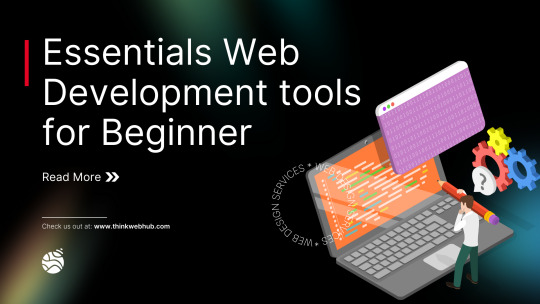
In the vast world of web development, having the right tools can make all the difference for beginners embarking on their coding journey. Whether you're interested in front-end design, back-end functionality, or optimizing website performance, the right set of tools can streamline your workflow and enhance your learning experience. This article will guide you through essential web development tools tailored for beginners, helping you kickstart your web development adventure.
Learn More: thinkwebhub.com
Introduction to Web Development
Web development involves creating and maintaining websites and web applications. It encompasses various aspects, including web design, content development, client-side/server-side scripting, network security configuration, and more. For beginners, diving into web development can be both exciting and overwhelming. Utilizing the right tools can simplify the learning curve and empower you to build impressive web projects.
Choosing the Right Tools
Before diving into specific tools, it's crucial to understand the different types of tools available and how to choose the ones that best suit your needs as a beginner. Consider factors like ease of use, community support, integration capabilities, and compatibility with your preferred programming languages.
Essential Front-End Tools
HTML and CSS Editors
For crafting the structure and styling of web pages, beginner-friendly editors like Visual Studio Code, Sublime Text, or Atom are highly recommended. These editors offer syntax highlighting, auto-completion, and plugins for enhanced productivity.
JavaScript Frameworks
Frameworks such as React, Vue.js, or AngularJS simplify front-end development by providing reusable components and handling complex interactions efficiently.
Version Control Systems
Git is essential for tracking changes in your codebase and collaborating with others. GitHub, a Git repository hosting service, enables you to showcase your projects and collaborate with fellow developers.
Back-End Development Tools
Server-Side Languages
Popular languages like Python (with Flask or Django), JavaScript (Node.js), or PHP (with Laravel) enable you to build dynamic and interactive web applications.
Databases and Management Systems
MySQL, PostgreSQL, or MongoDB are widely used databases for storing and managing data in web applications. Tools like phpMyAdmin or MongoDB Compass provide graphical interfaces for database management.
API Development Tools
Tools like Postman simplify testing and interacting with APIs, crucial for integrating services into your web applications.
Integrated Development Environments (IDEs)
IDEs such as Visual Studio Code, JetBrains IntelliJ IDEA, or Eclipse offer comprehensive environments for coding, debugging, and managing projects efficiently.
Testing and Debugging Tools
Browser developer tools (like Chrome DevTools) help in inspecting and debugging web pages. Testing frameworks such as Jest for JavaScript or PHPUnit for PHP assist in automating tests and ensuring code reliability.
Responsive Design Tools
Frameworks like Bootstrap and CSS Grid simplify creating responsive and mobile-friendly layouts. Tools like BrowserStack or Responsively App help test your website's responsiveness across various devices.
Performance Optimization Tools
Tools like Google PageSpeed Insights or GTmetrix analyze website performance and suggest optimizations for faster loading times. Image optimization tools like TinyPNG or ImageOptim reduce file sizes without compromising quality.
Security Tools
Understanding web security basics and utilizing tools like OWASP ZAP or Burp Suite helps identify and fix vulnerabilities in your web applications.
Collaboration Tools
Platforms like Slack, Trello, or Asana facilitate communication and project management within development teams, enhancing productivity and collaboration.
Resources for Learning and Improvement
Online platforms like Codecademy, freeCodeCamp, or Udemy offer courses and tutorials tailored for web development beginners. Engaging with developer communities on forums like Stack Overflow or Reddit can also accelerate your learning journey.
Tips for Effective Tool Utilization
Keep your tools updated to leverage new features and security patches. Embrace continuous learning by exploring new tools and techniques to stay ahead in the dynamic field of web development.
Visit Us : thinkwebhub.com
Common Challenges and How to Overcome Them
Expect challenges such as browser compatibility issues or debugging errors. Utilize online resources, forums, and tutorials to troubleshoot problems effectively and grow as a developer.
Conclusion
Selecting the right web development tools is essential for beginners to enhance productivity, streamline workflows, and accelerate learning. By leveraging these tools effectively, aspiring web developers can build impressive projects and embark on a successful career in the dynamic field of web development.
1 note
·
View note